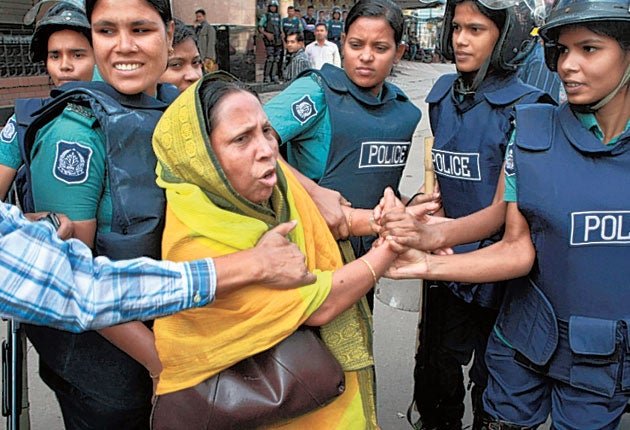'Battle of the Begums' brings Bangladesh to a standstill

Large parts of Bangladesh were brought to a halt yesterday as the result of a national strike triggered by the latest dispute between two female politicians whose rancour and antagonism stretches back almost two decades.
The strike was called by the opposition Bangladesh National Party (BNP), headed by former prime minister Khaleda Zia, after she was evicted from a grace-and-favour house in the centre of the capital Dhaka. The BNP claims the strike was also to protest at the government's creeping authoritarianism. The charges have been dismissed by Mrs Zia's arch rival Sheikh Hasina, the prime minister and head of the Awami League (AL), who said the strike was selfish and did nothing to help ordinary people.
Amid the accusations and counter accusations analysts said the clash is just the latest in a series of confrontations between the two women, often labelled the Battling Begums. Begum is a term of respect for a Muslim woman and both women are in their mid-60s.
Since it secured its independence from Pakistan in 1971 Bangladesh has remained politically unstable, enduring poor governance with interludes by military rulers. Its economy has long been fragile and held back by rampant corruption. Natural disasters have repeatedly added to the nation's woes.
"Strikes, demonstrations and political violence are both a rural and urban phenomenon. Clashes between activists of the AL and the BNP are congenital and can be traced back to some extent to the legendary rivalry between the two women," said Charu Lata Hogg, an expert on south Asian politics at Chatham House, the international affairs think tank.
"Political culture in Bangladesh is feverish and punctuated by bouts of violence. Political parties tend to cluster around particular personalities and families and competition is highly volatile and rancorous."
The specific trigger for the latest turmoil was a decision taken by the Bangladesh military to evict Mrs Zia from a house allotted to her on compassionate grounds in 1981 following the assassination of her husband Ziaur Rahman who was president and was killed in a coup attempt.
Mrs Zia, who is said to have several other properties in the capital, had appealed against the decision but on Monday the Bangladesh Supreme Court rejected her case. Military authorities said Mrs Zia left the home voluntarily to respect the court order, but she has said she was dragged out.
The military said the decision to evict her had been taken because there was evidence she had been using the property for political purposes. Officials said this was against regulations.
But many see a tit-for-tat element in the affair. During her second term as Prime Minister, Mrs Zia cancelled the long-term lease on another state-owned property that was occupied by Mrs Hasina.
In advance of yesterday's strike, hundreds of opposition activists were reportedly detained as the authorities sought to undermine its effectiveness. Even so, much of Bangladesh came to a halt yesterday with just a handful of buses on the streets of the usually congested capital. Thousands of riot police had been deployed.
While there were no reports of major violence, Bangladeshi police fired tear gas at protesters near the capital and BNP activists reportedly threw bricks at police. There were also clashes between members of the BNP and AL.
Of serious concern for a country where more than 80 per cent of the population lives in poverty, the strikes brought garment exports to a halt. The trade accounts for more than 80 per cent of Bangladesh's exports, but yesterday there were no trucks arriving at the port city of Chittagong, officials said.
Bangladesh is struggling for growth and stability after two years of emergency rule that came to an end in 2008 with the election of Mrs Hasina for her second term as Prime Minister. Like Mrs Zia's husband, Mrs Hasina's father, Sheikh Mujibur Rahman, the founder and first President of Bangladesh, was murdered with other members of his immediate family by military officers in 1975. Mrs Hasina and her sister survived because they were out of the country.
Join our commenting forum
Join thought-provoking conversations, follow other Independent readers and see their replies
Comments